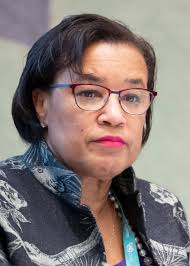Onome Amuge

Ministers and senior officials of Commonwealth member countries have called on the international community to reform its financial system and offer more support to small states in the wake of the COVID-19 pandemic.
The representatives made the call during a virtual event, co-hosted by the Commonwealth Secretariat and the Alliance of Small Island States (AOSIS).
In the course of the event, various issues were discussed among which is the need for improved access to financial resources and debt relief to secure small states’ economic resilience and maintain progress on their sustainable development goals (SDGs) and Nationally Determined Commitments (NDC) for tackling climate change.
The representatives also called for a concerted effort towards a reassessment of the criteria for debt relief, especially given the vulnerabilities of many states exposed by the pandemic.
Patricia Scotland, secretary-general of the Commonwealth, bemoaned the wide-ranging impact of COVID-19. She suggested the need for a new set of criteria for the financial support being offered to vulnerable small states and also pointed to the need for urgency in reassessing the methods used in classifying countries for official support.
She asserted that the Covid-19 pandemic is not a crisis to be ignored and that failure to fully tackle the issue immediately will put economies, livelihoods and communities at real risk.
“Many small states are facing an existential threat with the impact of the pandemic coming with huge economic ramifications alongside the ongoing and devastating effects of climate change. If we are to be able to meet the very real and urgent needs of these small states we must redefine economic vulnerability and as regional and multilateral institutions, we must agree on the appropriate definitions and measurement of economic vulnerability.” Scotland said.
According to estimates by the International Monetary Fund (IMF), as a result of the far-reaching economic and social impacts of COVID-19, the real output of small states could fall by 3.1 per cent with GDP potentially declining by about 8.6 per cent, twice that expected in larger countries.
Debt to GDP ratios in some Caribbean states are already past 100 per cent while Commonwealth small states debt ratios are expected to rise from 57.4 per cent to 70.6 per cent, which surpasses the IMF’s 60 per cent benchmark.
The IMF statistics also stated that Coronavirus has further weakened small states’ ability to respond to natural disasters and climate change. On average, Caribbean countries suffer yearly losses due to storms equivalent to 17 per cent of their GDP:. disasters cost small states about two per cent of GDP, more than four times that of larger countries.
The pandemic has also exposed how some small states as countries without special access to concessional resources fall into a middle-income trap and struggle to make their case for international assistance. These countries are not eligible for the G20’s debt service suspension initiative (DSSI) and do not qualify for other forms of relief, including that provided through the World Bank International Development Association and OECD countries official development assistance.
The Commonwealth is a voluntary association of 54 independent and equal sovereign states of which thirty-two are small states, many of which are island nations.
The association which includes both advanced economies and developing countries, aimed at supporting member countries to build democratic and inclusive institutions, strengthen governance and promote justice and human rights.








